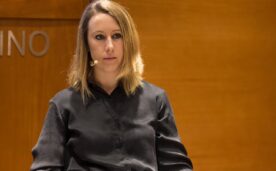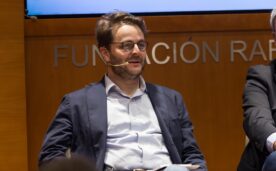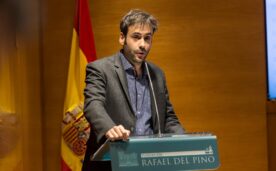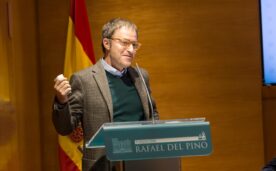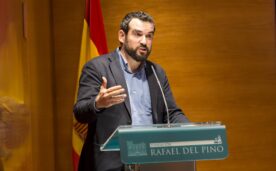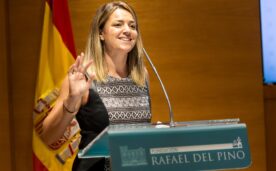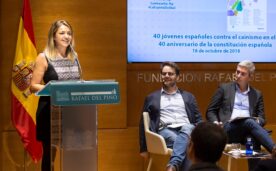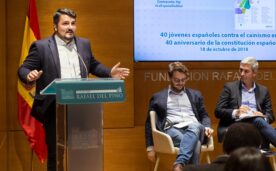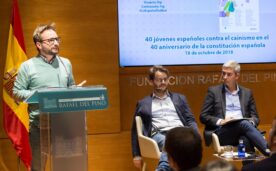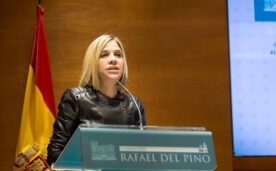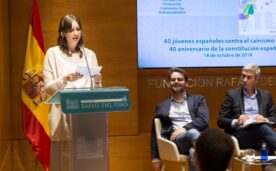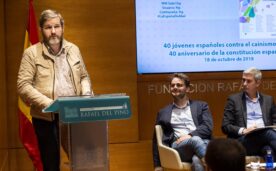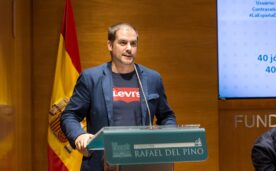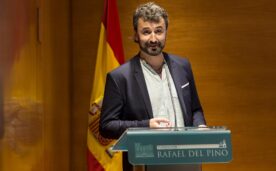On 18 October 2018, the Rafael del Pino Foundation organised the dialogue "40 young Spaniards against cainism on the 40th anniversary of the Spanish constitution" on the occasion of the publication of the work entitled "Abel's Spain" published by Deusto. The dialogue, which was moderated by Juan Claudio de Ramón and Aurora Nacarino-Braboen, was attended by Jorge Freire, Josu de Miguel, Álvaro Imbernón, Inés Calderón, Pedro Herrero Mestre, Jorge Bustos, Andrea Levy, Laura Fàbregas and Karina Sainz Borgo.
Aurora Nacarino-Brabopolitical scientist and journalist. She works in the Bureau of the Spanish Congress of Deputies. She writes a weekly column for Letras Libres and is a columnist for The Objective. She has participated in the book #Ciudadanos: Deconstructing Albert Rivera (Deusto).
John Claudius de Ramón is a Spanish diplomat and columnist born in Madrid in 1982. He is currently First Secretary at the Spanish Embassy to Italy in Rome. From 2011 to 2015 he was Counsellor at the Spanish Embassy in Ottawa. He regularly publishes political commentaries in El País and addresses cultural issues in other magazines such as The Objective, Jot Down, Letras Libres, Claves de Razón Práctica and El Ciervo. He holds a degree in Law and International Relations from ICADE and a degree in Philosophy from UNED. He is interested in the history of political ideas, federalism, nationalism and the future of Spain and Europe.
Jorge Freire is a philosopher by training and a teacher. In 2015, he published a biography of the American novelist Edith Wharton. His second book, Arthur Koestler. Our Man in Spain (2017), received good critical acclaim. He has participated in the anthologies Rulfo, cien años después (Huso, 2017) and Proyecto Wemen (Silex, 2018). He is a contributor to El Mundo.
Josu de Miguel is Associate Professor of Public Law at the Autonomous University of Barcelona. He has written several books and articles on the process of European integration, federalism and the economic constitution. He is also currently a contributor to El Correo and The Objective.
Álvaro Imbernón is a political scientist specialising in European Union affairs and International Relations. Partner of the political risk firm quantio and national researcher at the European Council on Foreign Relations (ECFR). He also teaches EU and International Relations at the Nebrija University. In the past, he has worked as a consultant in Belgium, Myanmar and Japan and has collaborated with the Spanish Ministry of Foreign Affairs, the United Nations University and think tanks such as ESADEgeo, FEPS or the World Economic Forum. In addition, in his spare time, Alvaro has served as an election observer and has contributed to the promotion of civil society initiatives related to the EU and the international arena.
Inés Calderón holds a degree in Information Science from the Complutense University and in Political Science from the UNED. For more than ten years she has been dealing with stock market and macroeconomic information in various media. Since 2014, she has been working on the programme El Objetivo de Ana Pastor, reporting on public money and transparency, and is a contributor to the newspaper El Economista.
Pedro Herrero Mestre is the father of Carmen, born in Oviedo, Manel, born in Gijon and Adria, born in Madrid. After subjecting his Catalan wife to too many moves and entering politics, he has worked as an advisor to the parliamentary group in the Junta General del Principado de Asturias and now elegantly performs his job in the Congress of Deputies while watching in horror as Madrid has become a city he likes.
Jorge Bustos He graduated with a National Prize in Literary Theory but decided to go into journalism. He started writing in magazines and local press. He was a reporter at Epoca magazine and editor at La Gaceta de los Negocios. He survived as a freelance writer for Zoom News, Jot Down and El Confidencial. In 2015, he joined the editorial staff of El Mundo, where he is currently head of Opinion and columnist, as well as parliamentary and sports columnist. He also collaborates as a literary critic in El Cultural, participates as a radio and television talk show host in COPE, Telecinco and La Sexta, and is a member of the advisory board of Fundeu. La granja humana was his first book. With El hígado de Prometeo he was a finalist for the Jovellanos International Essay Prize. In Crónicas biliares (Biliary Chronicles), he reflected the outburst of his literary vocation. His fourth book is Vidas cipotudas, a journey through the stellar moments of Spanish stubbornness.
Laura Fàbregas is a journalist with a degree in Political Science. She is the Delegate in Madrid of the Catalan digital newspaper Crónica Global and collaborates with other media such as TV3 and The Objective.
Karina Sainz Borgo was born in an extinct Caracas, when everything was about to go up in flames. That's why she likes to think of herself as a child of Black Friday and the age of a much earlier war. She works as a journalist specialising in cultural issues, although, in truth, she writes all the time. Many of these pages are published in Vozppopuli.com and Zenda.com. The rest is in the dark. She has a weakness for pachyderms, Fante and Flaubert and firmly believes in the football resurrection of Guti.
Ignacio Urquizu holds a European Doctorate in Sociology from the Complutense University of Madrid and is a Doctor-member of the Juan March Institute. He has been Visiting Fellow at Harvard University (Boston, USA) and visiting researcher at the European University Institute (Florence, Italy) and the University of Essex (UK). He has taught at the University of Essex, George Washington University (Madrid Centre), the Universidad Oberta de Catalunya, the Universidad Pablo Olavide and the Universidad Complutense de Madrid, where he is currently on leave of absence. After running as a PSOE candidate for the Cortes de Aragón in May 2015 and winning the seat, he left the regional chamber to join the Senate in early September of the same year. He has now been proposed again by the PSOE-Teruel as a candidate for the Congress of Deputies, leading the list for the province.
Jorge San Miguel is a History graduate with a postgraduate degree in political science and political communication, Jorge San Miguel is part of a new generation of Spanish political scientists. He has been editor, coordinator and director of communication at Politikon and co-author of the book La urna rota. He currently collaborates with media outlets such as El Mundo and El Español, is an advisor to the economic team of Ciudadanos and gives conferences on current political affairs.
